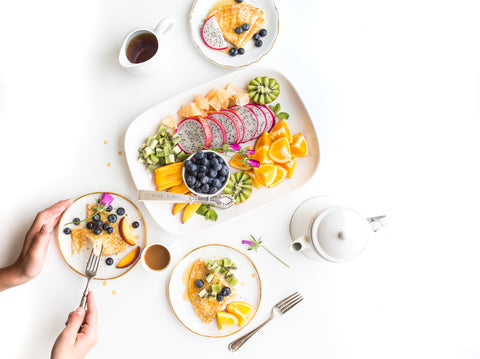
With these warmer months now upon us and with so many fun destinations in your near future, you want to keep feeling your best. You’ve been working hard to get your body spring break and summer vacation ready, and while now is your time to indulge—which, please do, you deserve it—there are some simple steps you can take to treat yourself, while still treating your body right.
Because we tend to eat out a lot more when we’re on vacation, we also tend to eat worse, without even being aware of it. Here are a few of our favorite tricks to eating healthy on vacation, while still fully enjoying yourself.
1. Share Some Small Plates
While on vacation, of course you should be trying all the great foods a new place has to offer. But let “trying” be the keyword. Try ordering a bunch of small plates to share amongst your friends and family. This way, everyone gets to try a couple different things and you avoid overeating. Not to mention, it makes your overall dining experience a lot more social.
2. Treat Yourself…Once a Day
As we said before, you should be indulging, you’re on vacation. It would honestly be cruel to ask you to say no to a specialty drink or a dessert menu. But try to limit yourself to one “treat” a day. Choosing one thing to splurge on each day gives you the leeway you need to be healthy, while still enjoying the perks of being (and eating) on vacation.

3. Don’t Forget About Fruits and Vegetables
This probably sounds silly, but yes, make sure that you’re still getting your daily serving of fruits and vegetables. This tip is exceptionally fun when you’re traveling to a warmer destination (um, can you say tropical fruit platter). While you’re busy sampling all types of new snacks, remember to order a salad for the table as well, or start your day with a smoothie, and rejuvenate your body with those tasty nutrients it needs.
4. Lots of Water, Lots of Walking
Drink a lot of water, as this is our number one tip on how to keep yourself feeling good. When you’re on the go, forgetting to keep your body hydrated happens more easily than we think. So, whether you’re running around sight-seeing or lounging on the beach, bring a water bottle to remind yourself to stay hydrated. And as an added bonus, drinking water helps burn more calories.
It all really just comes down to moderation. You shouldn’t deprive yourself. You’ve worked hard, you live healthy, and you’re on vacation, so let yourself snack a little, and order that dessert you’ve been dying to try. Just remember there’s a difference between treating yourself and overdoing it, and your body will thank you for being aware of this.






